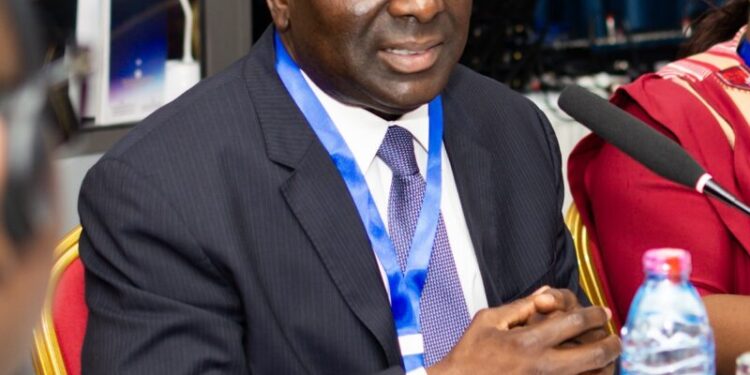The security threats and challenges facing some African nations are not country-restricted but transnational in nature, necessitating a collective strategy towards tackling them continentally, the Chief Executive Officer of the Centre for Intelligence and Security Analysis (CISA Ghana), Amb. Rasheed Seidu Inusah has observed.
In a welcome address at a two-day high-level international conference held on Thursday, 7 November and Friday, 8 November 2024 at the Lancaster Hotel, Accra, the former Director-General of Ghana’s National Intelligence Bureau (NIB) said the contagious nature of terrorism, insurgencies, political instability and conflicts grounded in resource tugs and mismanagement is often aided by misinformation and disinformation.
Mr. Inusah, a lawyer and former Ambassador who served in the Soviet Union, now Russia, said there was the need for African countries to change their security paradigms with the times.
The conference, which was on the theme, ‘New Paradigms for Ensuring Peace and Security in Africa – The need for closer collaboration with non-governmental security and intelligence organisations,’ brought together the heads of the security and intelligence apparatus of several African countries including Benin, Burkina Faso, Chad, Ivory Coast, The Gambia, Guinea, Liberia, Senegal, Sierra Leone, and Ghana.
Amb. Inusah noted at the conference that “our collective security as Africans is at a pivotal moment in our history,” explaining: “West African countries are experiencing mounting challenges in the form of political instability, insurgencies, foreign interference, and socio-economic disruptions.” These issues, Amb. Inusah noted, “have led to increased geopolitical instability and fractured alliances, adding: “There is, therefore, an urgent need to rethink National Security in order to overcome the myriad of threats to our region.”
He pointed out that Africa’s current security challenges were “complex in nature and multifaceted in scope,” but noted that there was a silver lining therein, as they “present us with new opportunities for meaningful collaboration and cooperation between governments and non-governmental organisations.”
Such collaboration, Amb. Inusah contended, was “no longer an option but an imperative.
This is primarily because our collective challenges have moved beyond the traditional to new forms of security challenges that are constantly evolving,” he explained.
He observed that the linkages between emerging threats such as security contagion, mis/disinformation and resource mismanagement, “reinforce the challenge we face on the continent and will continue to evolve to shape the security landscape of the future as well.”
Resource management, Amb. Inusah spelt out, “encompasses the effective and efficient deployment of national resources,” noting: “The security implications for mismanagement are myriad, given the long-term challenges that can result therefrom.”
Furthermore, he underscored the centrality of resource management “to the evolution of our security frameworks,” mentioning how “resource constraints will significantly slow our nations’ efforts to effectively respond to security challenges if not well managed.”
He said “collaboration and shared intelligence are the way forward.”
On security contagion, a phenomenon where security issues in one country or region spill over to neighbouring territories, Amb. Inusah stressed how serious a challenge it was in Africa, “as conflicts and crises spread across national borders, contributing to regional instability.”
“In essence, security contagion highlights the interconnectedness of regional security and the importance of cooperative approaches to addressing cross-border threats,” he indicated, adding: “The nature of contagion underscores the need for collaboration in maintaining stability and peace.”
On the other hand, he said misinformation and disinformation “are among the big challenges across the continent,” noting: “In this age, where information can spread like bushfire on social media and other platforms, false narratives can incite violence, deepen divisions, and undermine trust in institutions.”
Misinformation, he asserted, “fuels security contagion, whereas effective resource management can boost our resilience to such threats.”
The issues, he noted, can be addressed “holistically to develop a regional security strategy that will promote stability across our continent.”
“As you all know, we have had similar experiences and challenges across the continent. We have faced issues spanning colonialism, illegal migration, unemployment for our young people, political upheavals, internecine strife, transnational organised crime and now, climate change issues,” he mentioned.
As a continent, Amb. Inusah warned, “We will not make it if we do not stand together,” emphasizing: “Our experiences are similar, and so are our challenges.”
“Yes, we may speak many different languages and that should be our strength rather than what divides us. The sharing of best practices and the optimisation of resource allocation will undoubtedly enable us to build resilient security infrastructures that address current and emerging threats. We must stand together and work with governments across the region to bring the change that we all seek, because we have nowhere else, except our beloved Africa,” he urged.
He reiterated the need to “share insights, challenge conventional wisdom, and explore new strategies that will enhance security across Africa,” acknowledging: “The path forward may be complex, but with our collective knowledge and commitment, we can forge a more secure and prosperous future for our continent.”
“Let us resolve to strengthen our cooperation and intelligence-sharing mechanisms so that we can respond to emerging threats quickly and collaboratively,” he rallied.





























